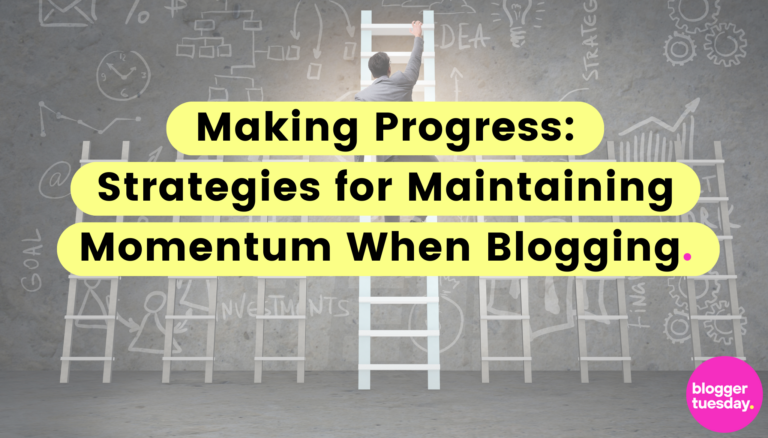Blogging feels incredible when you first start. There’s nothing better than having a platform to share your ideas with your readers online.
Over time, though, your attitude can change. What was once a joy slowly morphs into a chore.
Sitting down at the computer and writing yet more content for your niche feels like an ordeal.
As a blogger, what do you do about this? Forcing yourself to get on with it only works for a while, so that’s not really a solution.
And you can’t always hire someone else to do it. Either only you have the specialist knowledge and skills, or hiring someone who does it is too expensive.
This post explains why people lose momentum when blogging. We then look at strategies to help you stay on track and generate the blogging momentum you crave.
Why You Feel Your Commitment To Your Blog Waning
The precise reasons you feel your commitment to your blog waning will vary depending on your characteristics.
The problem might be unconscious. Deep down, you think you are unworthy of writing a blog or that it is “above your station,” so you self-sabotage. There is a mismatch between what you are trying to achieve and your perceived identity.
Related to this is the issue of low self-esteem. If you don’t think highly of yourself, you may believe you can’t achieve various tasks, including writing your blog.
Another problem could be fear of change. Becoming a successful blogger might mean your life takes a U-turn, and you must leave regular employment. You might be the sort of person who wants order and structure in their lives, not novelty and risk.
On a more basic level, the problem could also be distractions. Trappings of modern life, like social media, could derail your efforts to get work done.
Finally, issues like perfectionism or fear of failure might play a role. Negative thoughts may stop you from doing the necessary work.
Strategies To Maintain Momentum While Blogging
Fortunately, strategies exist to maintain momentum while blogging, even if you have the problems outlined above. Adopting these may improve your ability to stick it out long-term and get the desired results.
Recondition Your Mind
The most powerful way to maintain momentum while blogging is to recondition your mind. You must believe that you are worthy of a successful blog unconsciously.
Many people think they have a “station in life.” Cues from childhood program them into thinking a certain way about what they can do and achieve, which affects everything they do. However, you can recondition your mind.
For instance, you might try:
- Practicing self-awareness about your current beliefs about what you can achieve through blogging.
- Challenging your negative thoughts about yourself, only accepting what is objectively true.
- Changing how you think about negative statements about yourself and your ability to achieve blogging success.
- Visualizing yourself as a successful blogger and imagining yourself in that position while you create.
- Surrounding yourself with positive people who encourage you to do your best.
- Positive affirmations to reprogram your unconscious into believing you can be a great blogger.
Set A Time To Blog
Another powerful technique is to choose a fixed time to blog every day. Having a set time creates a habit that enables you to write consistently.
According to research, making something habitual works because it automates activities to free up mental resources. Instead of thinking, “Should I or shouldn’t I?” every time you sit down to blog, you do it automatically, getting a state of “deep work” or “flow” faster. Making blogging non-negotiable, like cleaning your teeth, is essential.
If you are a morning person, you might commit to writing your blog between 7 a.m. and 8 a.m. every day. For an evening person, flip this to 7 p.m. to 8 p.m.
The more consistent you are, the easier it is to keep momentum.
Ditch The Need To Be Perfect
You can also try ditching your desire to be perfect. Simply putting content out there will still provide value to your audience.
If you practice self-awareness, as recommended above, you’ll notice that perfectionism comes from a fear of judgment or disapproval from others. You are worried about putting something out there that might reveal you in a poor light.
Perfectionism is anathema to a sustainable blog because it increases the effort involved. People who insist on producing perfect content raise the bar, making publishing harder.
Focus On The Work Itself
Another approach is to focus on the work and fall in love with it instead of viewing it as a stepping stone to get to where you want to go. Enjoying it for its own sake makes it something you look forward to doing instead of feeling like you have to do it.
Go Public With Your Commitment
You can also try motivating yourself by going public with your commitment to your blog. For example, you might commit to producing one piece of work weekly for your audience on a specific range of topics. The prospect of readers emailing you to ask where your content is if you fail to stick to your plan can be a great form of accountability.
Get To Know Others
Another helpful tactic is to get to know others. Many writers find being part of a community highly motivating. The social element encourages them to continue putting in the work and effort.
Write Without Distractions
Finally, try writing without distractions by disconnecting the internet or writing by hand. Eliminating notifications can help you concentrate on the task at hand more deeply, enabling you to produce a higher quantity.
Wrapping Up
Maintaining momentum while blogging is about tracking your mental state and adopting behaviors to help you. Creating fantastic blogs is good, but having the ability to course-correct when you feel motivation waning is even better.
When following the strategies in this blog, maintain your self-awareness. If you feel demotivated, carefully consider why


